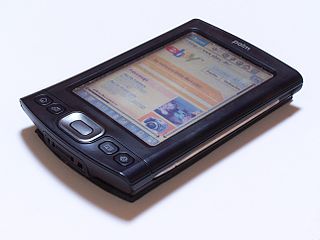
A personal digital assistant (PDA), also known as a handheld PC, is a multi-purpose mobile device which functions as a personal information manager. PDAs have been mostly displaced by the widespread adoption of highly capable smartphones, in particular those based on iOS and Android, and thus saw a rapid decline in use after 2007.

AirPort is a discontinued line of wireless routers and network cards developed by Apple Inc. using Wi-Fi protocols. In Japan, the line of products was marketed under the brand AirMac due to previous registration by I-O Data.
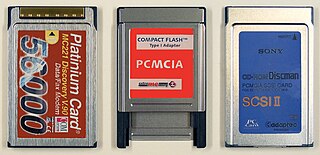
PC Card is a parallel peripheral interface for laptop computers and PDAs.

In computing, an expansion card is a printed circuit board that can be inserted into an electrical connector, or expansion slot on a computer's motherboard to add functionality to a computer system. Sometimes the design of the computer's case and motherboard involves placing most of these slots onto a separate, removable card. Typically such cards are referred to as a riser card in part because they project upward from the board and allow expansion cards to be placed above and parallel to the motherboard.
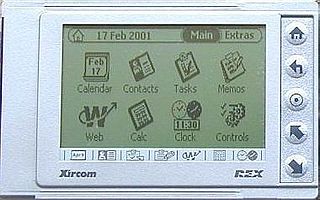
The REX 6000 is an ultra-thin Personal Digital Assistant (PDA) produced by Xircom, and later Intel, from about 2000 to 2001. Its primary claim to fame is as "The world's smallest full-function PDA", due to its unusual physical configuration as a PC card Type-II card. The REX may be synchronized by inserting it in a host PC's PCMCIA/PC-card slot. Docking stations were manufactured for connection to hosts without PC card Type-II slots, which allows the REX to be connected via a USB or serial connection.
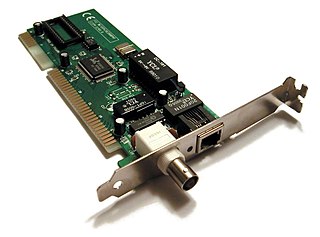
A network interface controller is a computer hardware component that connects a computer to a computer network.
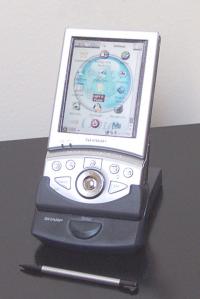
The Sharp Zaurus is the name of a series of personal digital assistants (PDAs) made by Sharp Corporation. The Zaurus was the most popular PDA during the 1990s in Japan and was based on a proprietary operating system. The first Sharp PDA to use the Linux operating system was the SL-5000D, running the Qtopia-based Embedix Plus. The Linux Documentation Project considers the Zaurus series to be "true Linux PDAs" because their manufacturers install Linux-based operating systems on them by default. The name derives from the common suffix applied to the names of dinosaurs.

ExpressCard, initially called NEWCARD, is an interface to connect peripheral devices to a computer, usually a laptop computer. The ExpressCard technical standard specifies the design of slots built into the computer and of expansion cards to insert in the slots. The cards contain electronic circuits and sometimes connectors for external devices. The ExpressCard standard replaces the PC Card standards.
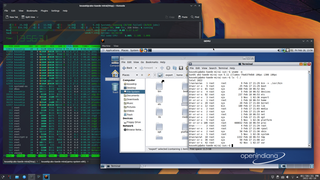
QEMU is a free and open-source emulator. It emulates a computer's processor through dynamic binary translation and provides a set of different hardware and device models for the machine, enabling it to run a variety of guest operating systems. It can interoperate with Kernel-based Virtual Machine (KVM) to run virtual machines at near-native speed. QEMU can also do emulation for user-level processes, allowing applications compiled for one architecture to run on another.

In computing, a docking station or port replicator (hub) or dock provides a simplified way to plug-in a mobile device, such as connect common peripherals to a laptop, or charge a smartphone. Because a wide range of dockable devices—from mobile phones to wireless mouse—have different connectors, power signaling, and uses, docks are unstandardized and are therefore often designed for a specific type of device.
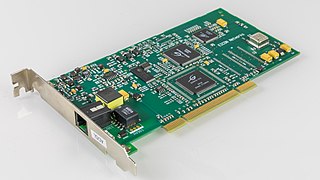
Eicon Networks Corporation, formerly Eicon Technology Corporation, is a privately owned designer, developer and manufacturer of communication products founded on October 12, 1984 with headquarters in Montreal, Quebec, Canada. Eicon products are sold worldwide through a large network of distributors and resellers, and supplied to OEMs.

The Jornada was a line of personal digital assistants or PDAs manufactured by Hewlett-Packard. The Jornada was a broad product line that included Palm-Size PCs, Handheld PCs, and Pocket PCs. The first model was the 820, released in 1998, and the last was the 928 model in 2002 when Compaq and HP merged. The Jornada line was then succeeded by the more popular iPAQ model PDAs. All Jornada models ran Microsoft Operating Systems that were based on Windows CE.

In systems management, out-of-band management is a process for accessing and managing devices and infrastructure at remote locations through a separate management plane from the production network. OOB allows a system administrator to monitor and manage servers and other network-attached equipment by remote control regardless of whether the machine is powered on or whether an OS is installed or functional. It is contrasted to in-band management which requires the managed systems to be powered on and available over their operating system's networking facilities.
COM One group was a manufacturer best known for its computer network adapters. The company was co-founded in 1987 by Jacques Saubade and Michel Petit and was headquartered in France. The name comes from the company's focus on modems.

TravelMate is a line of business-oriented laptop computers manufactured by Acer. Of the various notebook series Acer has offered, the TravelMate is designated as a lightweight business and professional computer built to withstand day-to-day activities. Travelmate laptops are well received by reviewers, often, however, they are faulted for a lack of visual appeal. The TravelMate name was previously used by Texas Instruments, which sold its mobile computing division to Acer in 1997. The TravelMate mainly competes against business computers such as Dell's Latitude, HP's EliteBook and ProBook, Lenovo's ThinkPad and Toshiba's Portégé.

The HP Pavilion dv6000 was a model series of laptops manufactured by Hewlett-Packard Company that featured 15.4" diagonal 16:10 displays.
A legacy-free PC is a type of personal computer that lacks a floppy or optical disc drive, legacy ports, and an Industry Standard Architecture (ISA) bus. According to Microsoft, "The basic goal for these requirements is that the operating system, devices, and end users cannot detect the presence of the following: ISA slots or devices; legacy floppy disk controller (FDC); and PS/2, serial, parallel, and game ports." The legacy ports are usually replaced with Universal Serial Bus (USB) ports. A USB adapter may be used if an older device must be connected to a PC lacking these ports. According to the 2001 edition of Microsoft's PC System Design Guide, a legacy-free PC must be able to boot from a USB device.

A mobile broadband modem, also known as wireless modem or cellular modem, is a type of modem that allows a personal computer or a router to receive wireless Internet access via a mobile broadband connection instead of using telephone or cable television lines. A mobile Internet user can connect using a wireless modem to a wireless Internet Service Provider (ISP) to get Internet access.

A dongle is a small piece of computer hardware that connects to a port on another device to provide it with additional functionality, or enable a pass-through to such a device that adds functionality.
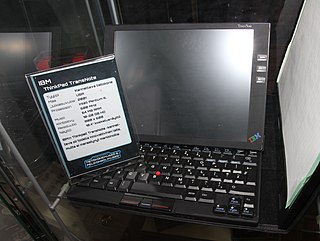
The IBM ThinkPad TransNote is a notebook computer by IBM.


















